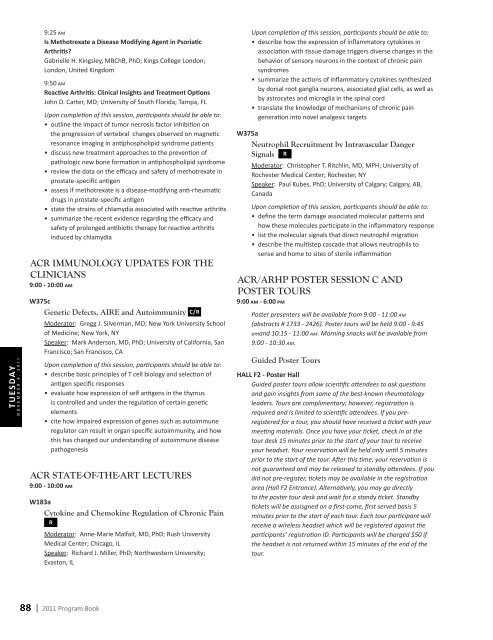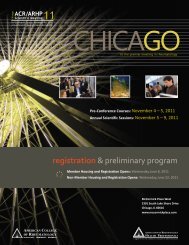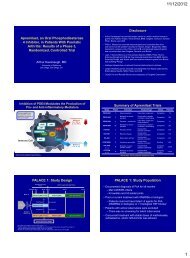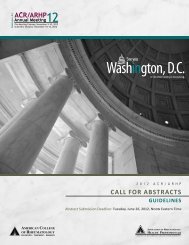Program Book - Confex
Program Book - Confex
Program Book - Confex
- No tags were found...
You also want an ePaper? Increase the reach of your titles
YUMPU automatically turns print PDFs into web optimized ePapers that Google loves.
TUESDAY<br />
November 8, 2011<br />
9:25 am<br />
Is Methotrexate a Disease Modifying Agent in Psoriatic<br />
Arthritis<br />
Gabrielle H. Kingsley, MBChB, PhD; Kings College London;<br />
London, United Kingdom<br />
9:50 am<br />
Reactive Arthritis: Clinical Insights and Treatment Options<br />
John D. Carter, MD; University of South Florida; Tampa, FL<br />
Upon completion of this session, participants should be able to:<br />
• outline the impact of tumor necrosis factor inhibition on<br />
the progression of vertebral changes observed on magnetic<br />
resonance imaging in antiphospholipid syndrome patients<br />
• discuss new treatment approaches to the prevention of<br />
pathologic new bone formation in antiphospholipid syndrome<br />
• review the data on the efficacy and safety of methotrexate in<br />
prostate-specific antigen<br />
• assess if methotrexate is a disease-modifying anti-rheumatic<br />
drugs in prostate-specific antigen<br />
• state the strains of chlamydia associated with reactive arthritis<br />
• summarize the recent evidence regarding the efficacy and<br />
safety of prolonged antibiotic therapy for reactive arthritis<br />
induced by chlamydia<br />
ACR IMMUNOLOGY UPDATES FOR THE<br />
CLINICIANS<br />
9:00 - 10:00 am<br />
W375c<br />
Genetic Defects, AIRE and Autoimmunity c/r<br />
Moderator: Gregg J. Silverman, MD; New York University School<br />
of Medicine; New York, NY<br />
Speaker: Mark Anderson, MD, PhD; University of California, San<br />
Francisco; San Francisco, CA<br />
Upon completion of this session, participants should be able to:<br />
• describe basic principles of T cell biology and selection of<br />
antigen specific responses<br />
• evaluate how expression of self antigens in the thymus<br />
is controlled and under the regulation of certain genetic<br />
elements<br />
• cite how impaired expression of genes such as autoimmune<br />
regulator can result in organ specific autoimmunity, and how<br />
this has changed our understanding of autoimmune disease<br />
pathogenesis<br />
ACR STATE-OF-THE-ART LECTURES<br />
9:00 - 10:00 am<br />
W183a<br />
Cytokine and Chemokine Regulation of Chronic Pain<br />
R<br />
Moderator: Anne-Marie Malfait, MD, PhD; Rush University<br />
Medical Center; Chicago, IL<br />
Speaker: Richard J. Miller, PhD; Northwestern University;<br />
Evaston, IL<br />
Upon completion of this session, participants should be able to:<br />
• describe how the expression of inflammatory cytokines in<br />
association with tissue damage triggers diverse changes in the<br />
behavior of sensory neurons in the context of chronic pain<br />
syndromes<br />
• summarize the actions of inflammatory cytokines synthesized<br />
by dorsal root ganglia neurons, associated glial cells, as well as<br />
by astrocytes and microglia in the spinal cord<br />
• translate the knowledge of mechanisms of chronic pain<br />
generation into novel analgesic targets<br />
W375a<br />
Neutrophil Recruitment by Intravascular Danger<br />
Signals R<br />
Moderator: Christopher T. Ritchlin, MD, MPH; University of<br />
Rochester Medical Center; Rochester, NY<br />
Speaker: Paul Kubes, PhD; University of Calgary; Calgary, AB,<br />
Canada<br />
Upon completion of this session, participants should be able to:<br />
• define the term damage associated molecular patterns and<br />
how these molecules participate in the inflammatory response<br />
• list the molecular signals that direct neutrophil migration<br />
• describe the multistep cascade that allows neutrophils to<br />
sense and home to sites of sterile inflammation<br />
ACR/ARHP POSTER SESSION C AND<br />
POSTER TOURS<br />
9:00 am - 6:00 pm<br />
Poster presenters will be available from 9:00 - 11:00 am<br />
(abstracts # 1733 - 2426). Poster tours will be held 9:00 - 9:45<br />
amand 10:15 - 11:00 am. Morning snacks will be available from<br />
9:00 - 10:30 am.<br />
Guided Poster Tours<br />
HALL F2 - Poster Hall<br />
Guided poster tours allow scientific attendees to ask questions<br />
and gain insights from some of the best-known rheumatology<br />
leaders. Tours are complimentary; however, registration is<br />
required and is limited to scientific attendees. If you preregistered<br />
for a tour, you should have received a ticket with your<br />
meeting materials. Once you have your ticket, check in at the<br />
tour desk 15 minutes prior to the start of your tour to receive<br />
your headset. Your reservation will be held only until 5 minutes<br />
prior to the start of the tour. After this time, your reservation is<br />
not guaranteed and may be released to standby attendees. If you<br />
did not pre-register, tickets may be available in the registration<br />
area (Hall F2 Entrance). Alternatively, you may go directly<br />
to the poster tour desk and wait for a standy ticket. Standby<br />
tickets will be assisgned on a first-come, first served basis 5<br />
minutes prior to the start of each tour. Each tour participant will<br />
receive a wireless headset which will be registered against the<br />
participants’ registration ID. Participants will be charged $50 if<br />
the headset is not returned within 15 minutes of the end of the<br />
tour.<br />
88<br />
2011 <strong>Program</strong> <strong>Book</strong>





